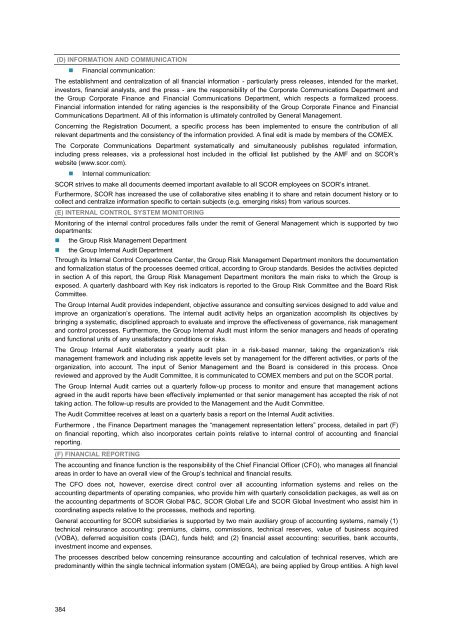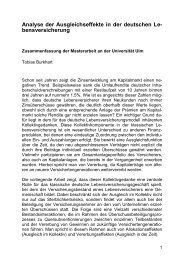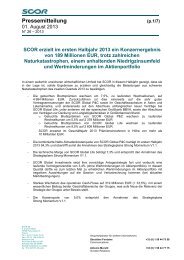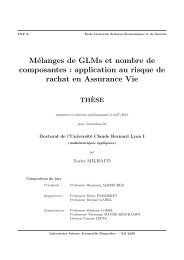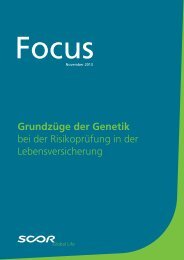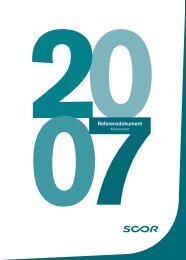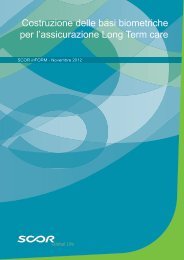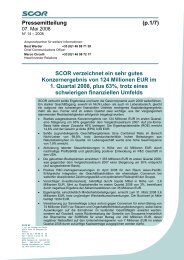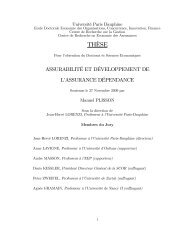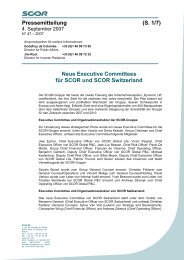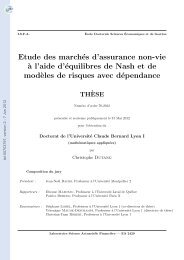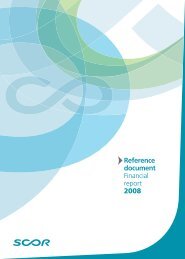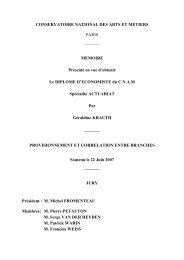4.4 Legal risk - Scor
4.4 Legal risk - Scor
4.4 Legal risk - Scor
Create successful ePaper yourself
Turn your PDF publications into a flip-book with our unique Google optimized e-Paper software.
(D) INFORMATION AND COMMUNICATION<br />
• Financial communication:<br />
The establishment and centralization of all financial information - particularly press releases, intended for the market,<br />
investors, financial analysts, and the press - are the responsibility of the Corporate Communications Department and<br />
the Group Corporate Finance and Financial Communications Department, which respects a formalized process.<br />
Financial information intended for rating agencies is the responsibility of the Group Corporate Finance and Financial<br />
Communications Department. All of this information is ultimately controlled by General Management.<br />
Concerning the Registration Document, a specific process has been implemented to ensure the contribution of all<br />
relevant departments and the consistency of the information provided. A final edit is made by members of the COMEX.<br />
The Corporate Communications Department systematically and simultaneously publishes regulated information,<br />
including press releases, via a professional host included in the official list published by the AMF and on SCOR’s<br />
website (www.scor.com).<br />
• Internal communication:<br />
SCOR strives to make all documents deemed important available to all SCOR employees on SCOR’s intranet.<br />
Furthermore, SCOR has increased the use of collaborative sites enabling it to share and retain document history or to<br />
collect and centralize information specific to certain subjects (e.g. emerging <strong>risk</strong>s) from various sources.<br />
(E) INTERNAL CONTROL SYSTEM MONITORING<br />
Monitoring of the internal control procedures falls under the remit of General Management which is supported by two<br />
departments:<br />
• the Group Risk Management Department<br />
• the Group Internal Audit Department<br />
Through its Internal Control Competence Center, the Group Risk Management Department monitors the documentation<br />
and formalization status of the processes deemed critical, according to Group standards. Besides the activities depicted<br />
in section A of this report, the Group Risk Management Department monitors the main <strong>risk</strong>s to which the Group is<br />
exposed. A quarterly dashboard with Key <strong>risk</strong> indicators is reported to the Group Risk Committee and the Board Risk<br />
Committee.<br />
The Group Internal Audit provides independent, objective assurance and consulting services designed to add value and<br />
improve an organization’s operations. The internal audit activity helps an organization accomplish its objectives by<br />
bringing a systematic, disciplined approach to evaluate and improve the effectiveness of governance, <strong>risk</strong> management<br />
and control processes. Furthermore, the Group Internal Audit must inform the senior managers and heads of operating<br />
and functional units of any unsatisfactory conditions or <strong>risk</strong>s.<br />
The Group Internal Audit elaborates a yearly audit plan in a <strong>risk</strong>-based manner, taking the organization’s <strong>risk</strong><br />
management framework and including <strong>risk</strong> appetite levels set by management for the different activities, or parts of the<br />
organization, into account. The input of Senior Management and the Board is considered in this process. Once<br />
reviewed and approved by the Audit Committee, it is communicated to COMEX members and put on the SCOR portal.<br />
The Group Internal Audit carries out a quarterly follow-up process to monitor and ensure that management actions<br />
agreed in the audit reports have been effectively implemented or that senior management has accepted the <strong>risk</strong> of not<br />
taking action. The follow-up results are provided to the Management and the Audit Committee.<br />
The Audit Committee receives at least on a quarterly basis a report on the Internal Audit activities.<br />
Furthermore , the Finance Department manages the “management representation letters” process, detailed in part (F)<br />
on financial reporting, which also incorporates certain points relative to internal control of accounting and financial<br />
reporting.<br />
(F) FINANCIAL REPORTING<br />
The accounting and finance function is the responsibility of the Chief Financial Officer (CFO), who manages all financial<br />
areas in order to have an overall view of the Group’s technical and financial results.<br />
The CFO does not, however, exercise direct control over all accounting information systems and relies on the<br />
accounting departments of operating companies, who provide him with quarterly consolidation packages, as well as on<br />
the accounting departments of SCOR Global P&C, SCOR Global Life and SCOR Global Investment who assist him in<br />
coordinating aspects relative to the processes, methods and reporting.<br />
General accounting for SCOR subsidiaries is supported by two main auxiliary group of accounting systems, namely (1)<br />
technical reinsurance accounting: premiums, claims, commissions, technical reserves, value of business acquired<br />
(VOBA), deferred acquisition costs (DAC), funds held; and (2) financial asset accounting: securities, bank accounts,<br />
investment income and expenses.<br />
The processes described below concerning reinsurance accounting and calculation of technical reserves, which are<br />
predominantly within the single technical information system (OMEGA), are being applied by Group entities. A high level<br />
384


